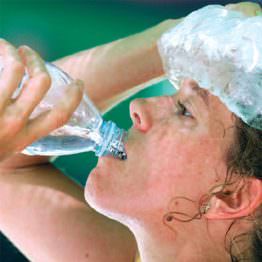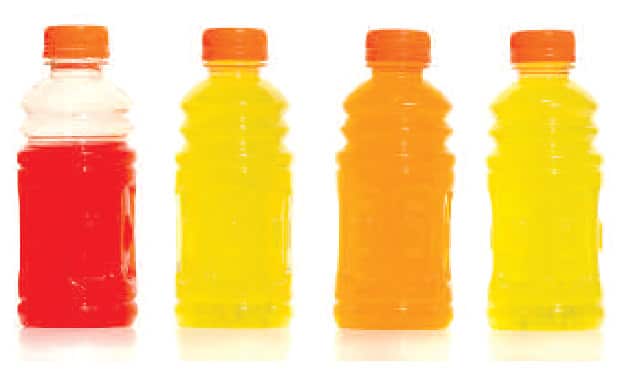July 26th, 2016
USTA Sport Science: Tennis Hydration, Dehydration Tips

session or match dehydrated.
Dehydration of as little as 1-2 percent of body weight (only 1.5-3 pounds for a 150 lb. athlete) has been shown to reduce performance. Dehydration of 3 percent or more of body weight increases a tennis player’s risk of heat-related illness (heat cramps, heat exhaustion or heat stroke).
For every percent of body weight that is lost during play, an athlete’s core body temperature can rise by 0.5 F. This results in the athlete’s heart working harder by 3-7 beats per minute at the same work rate.
When a tennis player loses 3 percent of body weight due to sweating, it can result in an increase in core body temperature of more than 1F and an increase in heart rate of between 10-20 beats per minute. This results in an athlete needing to work more than 10 percent harder to accomplish the same amount of work as when he/she is fully hydrated.
Dehydration is not only a health concern, but it also reduces a tennis player’s on-court performance.
RECOMMENDED GUIDELINES
Before Practice or Matchplay
Drink at least 16-20 oz. of water (one standard bottle) or electrolyte-enhanced sports drink two hours before the tennis practice or matchplay.
During Practice or Matchplay
Drink 4-8 oz. (4-8 normal swallows or 1.4-1.2 a regular size bottle) for a light to medium sweater and 8-16 oz. (8-16 normal swallows or a 1.2-3.4 full regular size bottle) for a heavy sweater of water or electrolyte-enhanced carbohydrate fluid every changeover during practice or matchplay (32-60 oz. of fluid per hour).
If practice or matchplay is expected to be longer than 60 minutes, an electrolyte-enhanced carbohydrate beverage would be a better option.
After Practice or Matchplay
Drink at least one regular-size bottle (20 oz.) of electrolyte-enhanced carbohydrate sports drink per pound of body weight lost within a two-hour period. Replace between 120-200 percent of body weight lost per exercise session. It is also helpful to consume some protein to help aid recovery. 10-20 grams of protein within 30 minutes of practice or matchplay will help speed recovery.
Adding extra sodium to the beverage will also speed rehydration by allowing the athlete to drink more fluid and retain more fluid in the system.
What carbohydrate content should I drink on court?
Drinks that contain more than 7-9 percent carbohydrates (19 grams per 8 oz., or 48 grams per 20 oz.) may slow the rate at which fluid is absorbed, and is not recommended during exercise. An ideal sports drink will contain between 6-8 percent carbohydrates and electrolytes to help replenish lost nutrients during heavy training or matchplay.
Beverages containing caffeine, alcohol or carbonation are not as effective as sports drinks in rehydrating the body. Fluids with salt (sodium chloride) not only help replace lost salt in an athlete’s sweat, but also increase thirst and voluntary fluid intake as well as offsetting losses due to urination.
Acknowledgements:
This material was compiled by the USTA national body with the assistance of the following individuals:
Mark Kovacs, PhD, CSCS — Manager of Sport Science
Michael Yorio, MD — US Open Tournament Physician
Jessica Battaglia, MS, ATC/L — Assistant to Coaching Education and Sport Science
Paul Lubbers, PhD — Director of Coaching Education
Paul Roetert, PhD, FACSM — Managing Director of Player Development
Please see the USTA Player Development website for more information on heat and hydration issues at www.playerdevelopment.usta.com.



